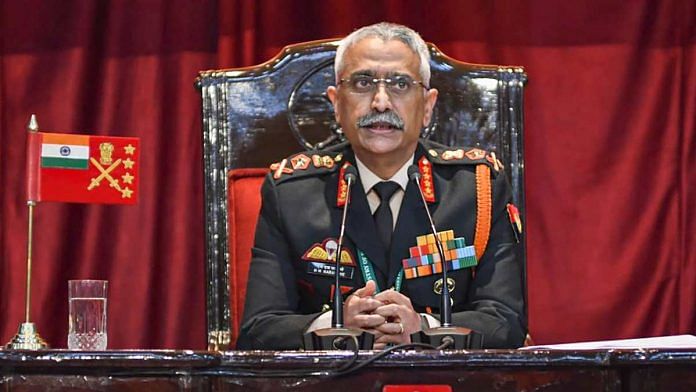New Delhi: Stressing that India is prepared to hold its ground in eastern Ladakh “for as long as needed” to achieve a non-detrimental solution to the Ladakh standoff, Army chief General M.M. Naravane said Tuesday the Army was rebalancing towards the northern borders.
Noting that soldiers are fully prepared to tackle any challenge, General Naravane said India is focusing on a solution to the Ladakh standoff through talks, which will be based on “equal and mutual security”.
“As events in eastern Ladakh show, there was indeed a requirement of carrying out re-balancing of the northern border. That is what we have put in place,” the Army chief said, addressing the annual press conference ahead of Army Day on 15 January.
The Army chief also said a collusive threat from Pakistan and China exists, and they together form a “potent threat”, which cannot be wished away.
Naravane also played down the withdrawal of nearly 10,000 Chinese troops from their depth areas, saying there is no reduction in the strength of troops at friction points in eastern Ladakh.
Admitting China had the first mover advantage in eastern Ladakh, Naravane said the Army is fully alert not just there, but all along the northern borders as well as the central and eastern sectors.
ThePrint had reported that a number of key decisions have been taken, including the creation of a separate artillery brigade for the Mountain Strike Corps, besides the dual-tasking of the Mathura-based 1 Corps, which was initially a Strike Corps aimed at Pakistan.
Also read: Army Chief Naravane’s remark on Lipulekh an insult to our history: Nepal Defence Minister
‘No change in the status quo’
General Naravane said whatever has clearly emerged from the northern standoff is the need for restructure and to enhance capabilities.
“As far as capability development is concerned, all around development has taken place. We have signed many contracts — weapons and gear to infantry, communication, engineering systems… it has been all around development and each arm and services have got what they need,” he said.
Asked by ThePrint whether the current positions held by India and China will become the new status quo, he said, “The situation is the same as was prevailing last year.”
“There is no change in the status quo. We are hoping that, based on the principle of mutual and equal security, we will be able to reach an agreement, which will result in disengagement and de-escalation — disengagement from friction areas and then an overall de-escalation in strength of troops from the border areas.”
Solution must not be ‘detrimental’ to our interest
Talking about the way forward, the Army chief said the force was awaiting dates for the next round of corps commander-level talks between India and China.
“Eight rounds of talks have taken place. Each of these rounds have preceded or followed by diplomatic parleys. We will ensure that through the medium of talks, we reach a solution, which is acceptable and is not detrimental to our interest,” he said.
Asked how long it would take for the solution, he said, “If talks prolong, so be it. We are prepared to hold our ground, where we are, for as long as needed to achieve our national goals.”
Collusive threat of China and Pakistan
Speaking about the collusive threat from Pakistan and China, the Army chief said there is no doubt that both together form a potent threat.
“There is an aspect of collusivity, which cannot be wished away. That is very much part of our strategy and planning”, he said.
Explaining further, Naravane said there is no doubt that collusive threat exists.
“This is not something which is part of some strategic paper. It is manifesting on ground. There is increased cooperation between China and Pakistan in military and non-military areas,” he said.
Ladakh not an intelligence failure
General Naravane said that the Army had knowledge about movement of Chinese troops for training purpose, but the People’s Liberation Army suddenly moved towards India and had the first mover’s advantage.
“Mobilisation by China is not new. They come every year for training. We had full info on where all they were. We were regularly monitoring, but suddenly they moved (to LAC). They had the first mover advantage,” the Army chief said.
He said it could never have been anticipated as the first mover advantage will always be there “like we had in August”.
“We were in eye ball to eye ball and they did not realise we will surprise them,” he said, referring to the operation carried out by India in the end of August when they occupied the Kailash range in the southern banks.
Also read: What India, Saudi, UAE look to gain from Gen. Naravane trip, a first by an Indian Army chief



